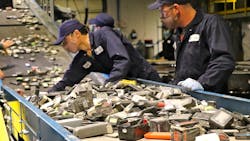Battery Recycler Li-Cycle Pausing Work on Big NY Project
Li-Cycle Holdings Corp. executives announced Oct. 23 they are pausing construction work on the company’s much-anticipated Rochester Hub project in upstate New York. The leaders of the largest lithium-ion battery recycler in North America cited rising construction costs as the reason for the pause and added they have launched “a comprehensive review of the go-forward strategy for the project.”
The Rochester Hub was first announced in 2020 as a complement to Li-Cycle’s existing battery-recycling “Spoke” facilities. Where spoke sites break down lithium-ion batteries in a safe manner, the hub is intended to process the materials from spoke to the point of having them be reused in battery production and other uses or sending them to other recyclers such as steel or plastic plants for further processing. Li-Cycle claims its zero-waste process recovers at least 95% of material, compared to the industry norm’s 50% recovery rate.
The Rochester project, which was expected to cost roughly $485 million to complete, was backed by the Department of Energy earlier this year with a $375 million loan under the Advanced Technology Vehicles Manufacturing program. That initiative was created in 2007 and has funded $8 billion in projects for vehicles that achieve defined fuel economy targets as well as backing manufacturers of components or materials that support eligible vehicles.
If completed as first envisioned, the Hub will create 270 jobs and have a processing capacity of up to 90,000 tons of lithium-ion battery material. The plant would then be able to deliver up to 8,500 tons of lithium carbonate, 48,000 tons of nickel sulphate, and 7,500 tons of cobalt sulphate every year.
Li-Cycle executives will release the company’s third-quarter results on Nov. 13 and provide an update on the review process at that time. Shares of the Toronto-based company (Ticker: LICY) plunged more than 45% on the construction pause news, which slashed the company’s market capitalization to about $220 million.
